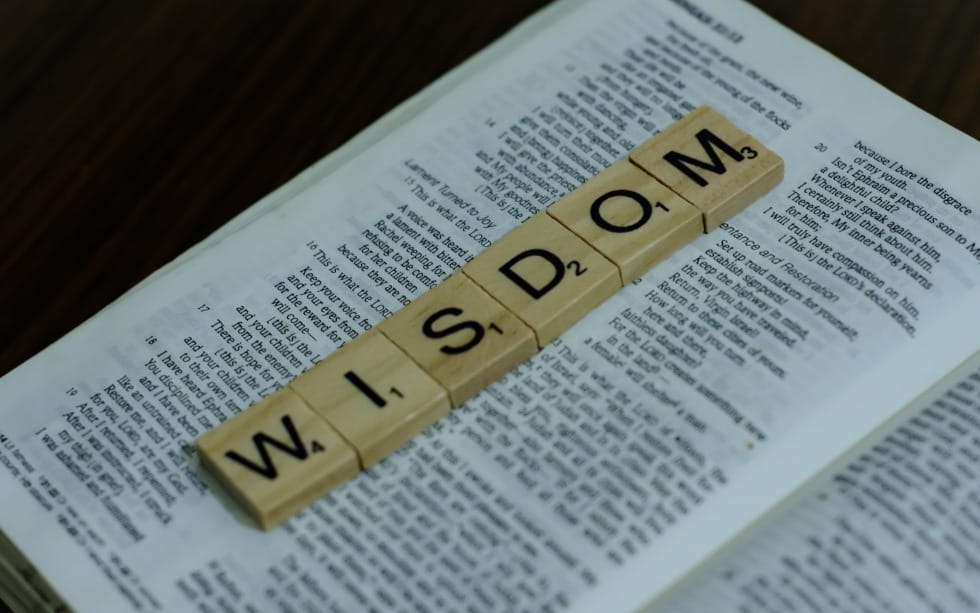The Fear of the Lord is the Beginning of Wisdom
The Book of Proverbs serves as a timeless source of practical advice and ethical principles for individuals seeking to navigate the complexities of life with discernment and integrity.

Proverbs 1:1-7
Today's Scripture Passage
A Few Thoughts to Consider
Would you call yourself a wise person?
On Saturdays, we’ll look at wisdom principles in the Bible. The obvious place to start is the book of Proverbs. The Book of Proverbs was written by King Solomon, the third king of ancient Israel. It is a collection of wisdom literature that consists of short, pithy sayings and maxims designed to provide guidance for living a virtuous life. The book emphasizes the importance of wisdom, knowledge, and the fear of the Lord as the foundation of a meaningful and righteous existence.
Proverbs covers a wide range of topics, including morality, family, work, relationships, and personal conduct. It encourages readers to seek understanding, make wise choices, and cultivate good character to lead a fulfilling life in accordance with God's will. The Book of Proverbs serves as a timeless source of practical advice and ethical principles for individuals seeking to navigate the complexities of life with discernment and integrity.
Ray Ortlund states, “The word ‘proverbs’ alerts us to the style of this book. A biblical proverb is a briefly stated, time-tested insight into real life.”[1] Timothy Keller adds to this thought and says, "The point of a proverb, then, is to get rightly related to reality through hard thinking and sustained reflection.”[2]
As my friend Dr. Phil Brown says,
“The wisdom of Proverbs is the wisdom from God the Father, through the Son, by the Spirit, to Solomon and thus to all God’s sons, in whom dwells the Spirit of wisdom, for whom Christ has been made the wisdom of God, and through whom God the Father is glorified as His wisdom is manifested in our lives.”[3]
In the words of Solomon in Proverbs 1,
1 The proverbs of Solomon son of David, king of Israel:
2 For learning wisdom and discipline;
for understanding insightful sayings;
3 for receiving prudent instruction
in righteousness, justice, and integrity;
4 for teaching shrewdness to the inexperienced,
knowledge and discretion to a young man—
5 let a wise person listen and increase learning,
and let a discerning person obtain guidance—
6 for understanding a proverb or a parable,
the words of the wise, and their riddles.
7 The fear of the Lord
is the beginning of knowledge;
fools despise wisdom and discipline.
The fear of the Lord is a reverential awe and deep respect for God, often associated with a profound understanding of his holiness and a desire to live in accordance with His will.
According to one writer, “Fearing the Lord means to be in reverent awe of His holiness, to give Him complete reverence and to honor Him as the God of great glory, majesty, purity and power.”[4]
A proper fear of God lays a basic foundation for wisdom. As Bruce Waltke writes, “What the alphabet is to reading, what notes are to music, what numerals are to mathematics, the fear of I AM is to gaining the book’s wisdom and instruction.”[5]
A Meditation to PRAY
Praise | Thank you for wisdom. I praise you for the reality that as I grow closer to you and think more like you, I can make wise choices.
Release | Lord, I trade my wisdom for your wisdom. On my own, I am ignorant.
Ask | I need your wisdom in my interactions in with family, coworkers, and friends today.
Yield | May your wisdom guide my thoughts, words, and actions, so I may walk in your light and fulfill your purpose for my life.
A Challenge to Act Like Christ
There is a link between being knowledgeable and being wise.
Bruce Waltke writes,
“Knowledge is a metonymy for the book’s inspired proverbs and sayings. Wisdom without knowledge is impossible. As knowledge of the laws of aerodynamics is essential to build an airplane, so building a wise life demands knowledge of the revealed divine moral order—the deed-destiny nexus—taught in Proverbs.”[6]
Becoming a Christian doesn’t make you a wise person overnight. But it does ensure your life is built on the right foundation. And the more you learn to think like Christ thinks and react as Christ reacts, the wiser you will become.
*Unless you specify otherwise, comments and questions you ask may be featured in upcoming podcast episodes.
[1] ESV Gospel Transformation Bible, 793
[2] Keller, Timothy; Keller, Kathy. God's Wisdom for Navigating Life (p. xvi). Penguin Publishing Group. Kindle Edition.
[3] Proverbs handout
[4] https://www.olivetree.com/blog/what-does-it-mean-to-fear-the-lord/
[5] Waltke, Bruce K.,De Silva, Ivan D. V.. Proverbs: A Shorter Commentary (Kindle Locations 2031-2032). Eerdmans. Kindle Edition.
[6] Waltke, Bruce K.,De Silva, Ivan D. V.. Proverbs: A Shorter Commentary (Kindle Locations 2016-2018). Eerdmans. Kindle Edition.




Comments ()